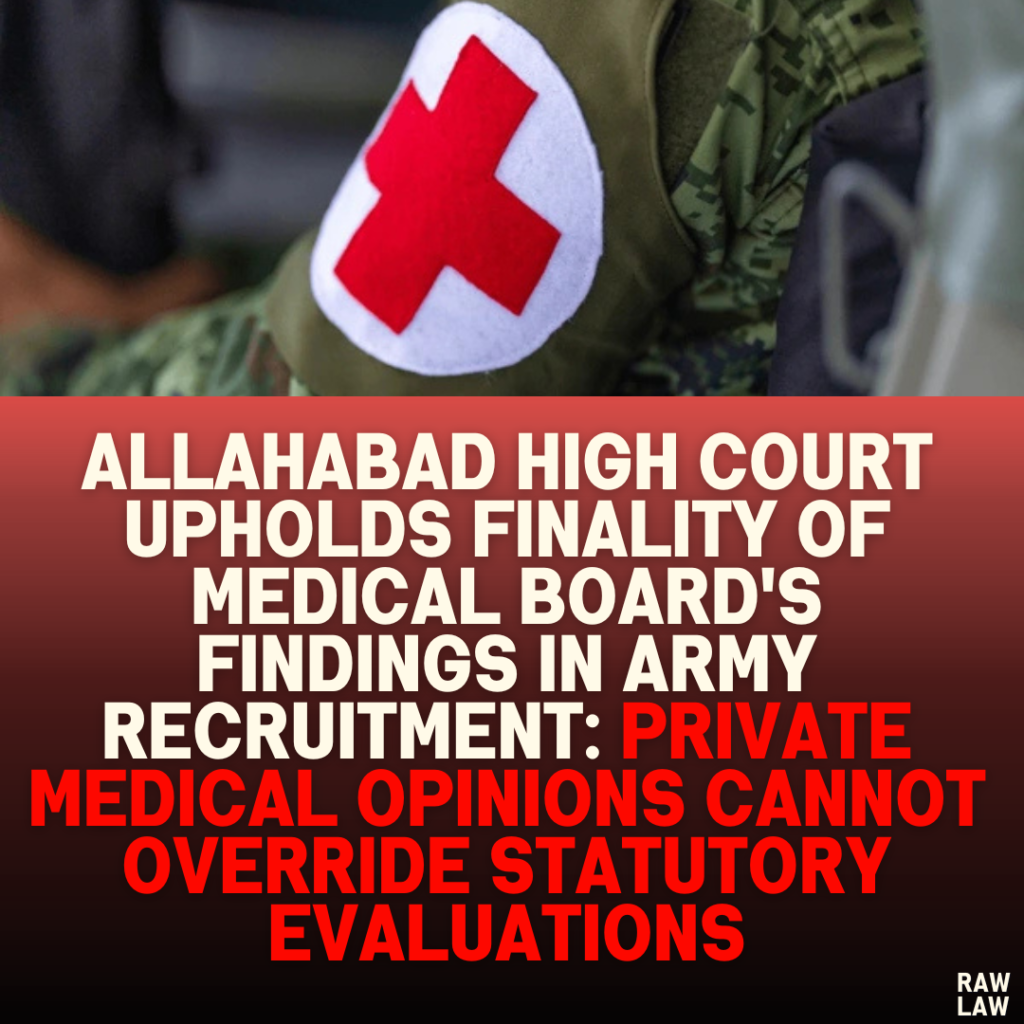Court’s Decision:
The Allahabad High Court dismissed a special appeal challenging the rejection of a writ petition. The petitioner had sought the constitution of a fresh Medical Board after being declared medically unfit by the Medical Board and subsequent reviews during the recruitment process for the post of Agni Veer (General Duty) in the Indian Army. The Court upheld the decision of the Medical Board and ruled that its expert opinion, provided under the prescribed procedures, is binding and cannot be overridden by a subsequent private medical report.
Key observation:
“The expert opinion of the Medical Board in a recruitment process cannot be overridden by a subsequent report from another medical practitioner.”
Facts:
- The appellant applied for the post of Agni Veer (General Duty) in the Indian Army and successfully cleared the preliminary written examination and physical fitness tests.
- During the medical examination at Varanasi, the Medical Board declared the appellant unfit due to “Onychomycosis Specified right index finger.”
- The appellant was referred to a Senior Medical Officer (SRMO) and subsequently to a specialist at the Military Hospital, Prayagraj. Both reviews confirmed the initial diagnosis and declared him unfit.
- Dissatisfied, the appellant sought a private medical examination from a dermatologist at Moti Lal Nehru Medical College, Prayagraj. The private doctor opined that Onychomycosis is non-communicable and curable, issuing a certificate in support.
- The appellant approached the High Court, seeking the constitution of a fresh Medical Board based on this private medical opinion.
Issues:
- Can the findings of a recruitment Medical Board, constituted under statutory rules, be challenged based on a subsequent private medical opinion?
- Should the Court intervene in recruitment processes by directing the constitution of a new Medical Board for re-evaluation?
Petitioner’s Arguments:
The petitioner argued that:
- The initial Medical Board’s diagnosis was incorrect as Onychomycosis is non-communicable and curable, per the private medical opinion.
- A fresh medical evaluation would confirm his eligibility for recruitment.
Respondent’s Arguments:
The respondents contended that:
- The appellant underwent multiple evaluations, including by a specialist, all of which confirmed the diagnosis of unfitness.
- The procedures were conducted as per the recruitment rules, leaving no room for interference.
- Private medical opinions do not override findings by a duly constituted recruitment Medical Board.
Analysis of the Law:
The Court analyzed the principles governing judicial interference in medical evaluations during recruitment processes:
- Recruitment processes involve expert determinations, and Courts should avoid supplanting these findings without compelling evidence of procedural irregularities or arbitrariness.
- The statutory rules provide specific procedures for evaluating candidates’ fitness, which must be respected to maintain the integrity of recruitment processes.
Precedent Analysis:
The Court referred to two precedents:
- Md. Arshad Khan v. State of UP (2020): The Court observed that judicial interference in medical evaluations by recruitment boards should be limited, emphasizing the need for caution to prevent derailing recruitment processes.
- Vivek Kumar v. State of UP (2020): The Court held that medical evaluations during recruitment are matters of expert determination and Courts should not override them unless there is clear evidence of procedural lapses.
Court’s Reasoning:
- Adherence to Procedure: The recruitment process, including the medical evaluations, followed prescribed procedures under statutory rules. The Medical Board, Senior Medical Officer, and specialist doctor confirmed the appellant’s unfitness, leaving no basis for interference.
- Binding Nature of Expert Opinions: The Court emphasized the binding nature of expert opinions provided by recruitment Medical Boards and ruled that subsequent private medical reports cannot override these findings.
- Risk of Derailment: Allowing candidates to challenge recruitment evaluations based on private opinions could undermine the recruitment process’s integrity and fairness.
Key observation:
“Matters relating to medical evaluation of candidates in a recruitment process involve expert determination and it may not be desirable to supplant the procedure prescribed therefor.”
Conclusion:
The Court dismissed the special appeal, ruling that:
- The findings of the Medical Board and subsequent reviews are final and binding unless procedural flaws or arbitrariness are established.
- A subsequent private medical opinion does not justify the constitution of a fresh Medical Board.
Implications:
- Judicial Restraint in Recruitment Processes: This decision reaffirms that Courts should exercise caution in interfering with recruitment processes, especially those involving medical evaluations.
- Integrity of Recruitment Evaluations: By upholding the findings of recruitment Medical Boards, the judgment safeguards the recruitment process’s integrity and ensures consistency in expert determinations.
- Limitations of Private Reports: The ruling clarifies that private medical opinions cannot override findings made under statutory recruitment procedures.
This judgment reinforces the principle that expert evaluations conducted under statutory rules hold primacy in recruitment processes, ensuring fairness and consistency.




Pingback: Supreme Court Dismisses Special Leave Petition, Orders Payment of Sixth Pay Commission Benefits to Uttar Pradesh Jal Nigam Employees, Rejects Organizational Restructuring Excuse - Raw Law